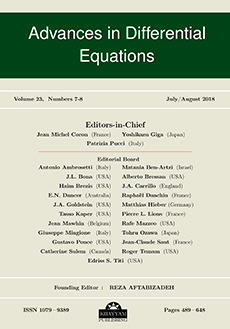Abstract
In this paper we prove that the equation ${du \over dt} + \sum_{i=0}^n a_i(t)u^i = f(t),$ $t \in [0,1]$, $u(0) = u(1)$, has for every continuous $f$ at most $n$ solutions provided that $n$ is odd, and the continuous coefficients $a_i$ satisfy $|a_n(t)| \ge \alpha > 0$ and $|a_i(t)| \le \beta,$ $i = 1,\dots,n-1$, with $\beta > 0$ sufficiently small. Furthermore, we show that this result implies that for a restricted subclass of polynomial vector fields of order $n$ in $\mathbb R^2$ the maximal number of limit cycles is $n$. This constitutes a special case of Hilbert's 16th problem.
Citation
Marta Calanchi. Bernhard Ruf. "On the number of closed solutions for polynomial ODE's and a special case of Hilbert's 16th problem." Adv. Differential Equations 7 (2) 197 - 216, 2002. https://doi.org/10.57262/ade/1356651851
Information





